1. Conduct a Stormwater Audit to find out about protecting water
quality. Can any of it be harvested for other uses?
|
Activity: Visit www.reefed.edu.au/guardians/
downloads/Stormwater_Audit.doc
Also see The School Water Audit |
2. Keep your outside drains clean and free of pollution by sweeping the
drains and gutters around your school.
|
Activity: Gross Pollutant Trap survey
Activity: The source of the problem |
3. Have your garden waste turned into mulch then mulch your garden to
reduce weeds and use less weed killer spray.
|
|
| 4. Never pour paint or chemicals down
outside
drains. |
Activity: Investigate the difference between stormwater and grey water (sewage) around your home and at your school. Listen outside your house, in the garden when the washing machine is working or after you have flushed the toilet.
Put a hose in a drain which runs off the roof then listen to see if you can hear where the water runs to. Are the sounds different? If everything is plumbed correctly, then stormwater is generally everything outside your house and grey water everything from inside your house.
www.melbournewater.com.au/content/library
/education/etp_virtual_tour/resources/resource_19.doc |
5. Tell other people what you've found out about about keeping drains clean.
Activity: Stencil colourful messages onto your bins, drains and gutters with messages that indicate where the water goes and what is affected, such as ‘This drain leads to the sea’ or ‘Only rain in drains’. Refer to the Yellow Fish website www.theyellowfishroad.com/ |
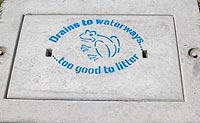 |
| 6. Store and cover rubbish so animals and birds are not attracted to it. Ravens, foxes, seagulls, rats and many other animals have learned to forage in bins for scraps. |
 |
7. Compost kitchen "waste" and use it on your garden to reduce the use of
fertilizers. Australia has a low nutrient system. When excess fertilizers are used they wash into the stormwater upsetting the balance in the water by causing blue-green algae to grow too quickly.
|
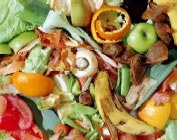
All these "wastes" can be composted |
| 8. Plant native plants in your garden that need less water and fertilizer. |
|
9. Chemicals we use can be too concentrated for natural systems to
process effectively. Find ways to reduce or eliminate chemical use.
|
Activity: A Matter of Concentration |
| 10. When using paints or poisonous chemicals take time to find out where
you can dispose of chemicals appropriately when you are finished. Ask at
your local council or hardware store. |
Activity: Keep it Clean |
| 11. Buy biodegradable products with re-useable packaging when you can . |
Activity: Turn junk into art: www.regionalartsnsw.com.au/
docs/artreach/art_of_junk_dec_03.pdf |
| 12. Pick up poo in a scooper when taking your pet for a walk or cleaning
up your yard. |
Activity: Design your own poooper scooper using plastic milk
cartons or other reusable packaging material |
| 13. Cigarette butts are the most common form of litter we can see. Help stop people throwing butts on the ground. |
 |
| 14. Use a fly swatter and other natural and organic means of dealing with
household pests. Using less poison is better for your health and less likely to end up in the water system. |
|
| 15. Wash your car on the lawn. The nutrients and water will be good for the lawn and will avoid entering the stormwater drains. |
|
16. Fix leaks, more oil ends up in the sea from urban runoff than tanker spills. Petro-chemical pollution is a problem when engines are not kept tuned.
Activity: Check your families garage or parking space for signs of oil leakage. Find out how often your car, lawnmower or motor bike is serviced |
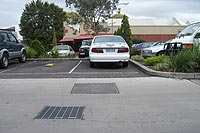
Car parks are notorious sources of
petrochemical stormwater |
| 17. Try bicarbonate of soda and vinegar as cleaning products. |
Activity: Do a scientific study of cleaning chemicals and compare to more natural alternatives |
18. Prevent erosion - look to make sure that loose piles of soil are covered so that the sediment (dirt) doesn’t contaminate or pollute the stormwater on windy and rainy days.
Activity: Keep Australia Beautiful, in partnership with Melbourne Water, have produced an active catchment diorama. Can you build your own catchment?
|
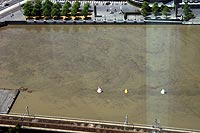
Mud swirls in the Yarra River
|
19. Participate in local Waterwatch programs to help monitor the water
quality in your local waterway.
Activity: Contact your local Waterwatch representative for more information www.waterwatch.org.au/join.html |
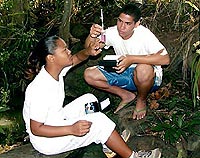
Stream sampling
|
| 20. Organise a display about the school’s water quality program in the
local shopping centre
. |
Activity: Review your council's State of the
Environment Report e.g. www.rpdc.tas.gov.au/soer/ilw/3/index.php
|



